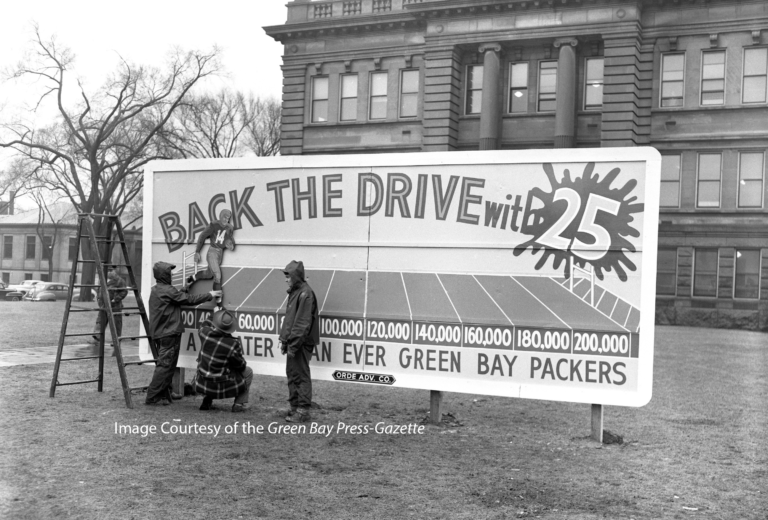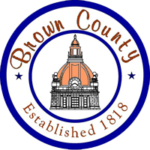1950 Stock Sale
Brown County Courthouse – Meeting Place of the Pack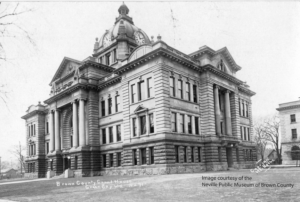 ers Board of Directors
ers Board of Directors
The first stockholders of the newly formed Green Bay Football Corporation met in the Brown County Courthouse on September 17, 1923. Team stockholder meetings continued to be held there until 1959. The courthouse was the scene of several pivotal moments in the history of the Packers: in 1933, the near-bankrupt team was placed in receivership in a courtroom; in 1935, meetings to authorize a second stock sale, and to approve reorganizing as The Green Bay Packers, Incorporated were held there. And, in late 1949, in response to another financial crisis, the Packers Board of Directors would decide there if the team would be taken over by a small group of private investors or continue to be a community property.
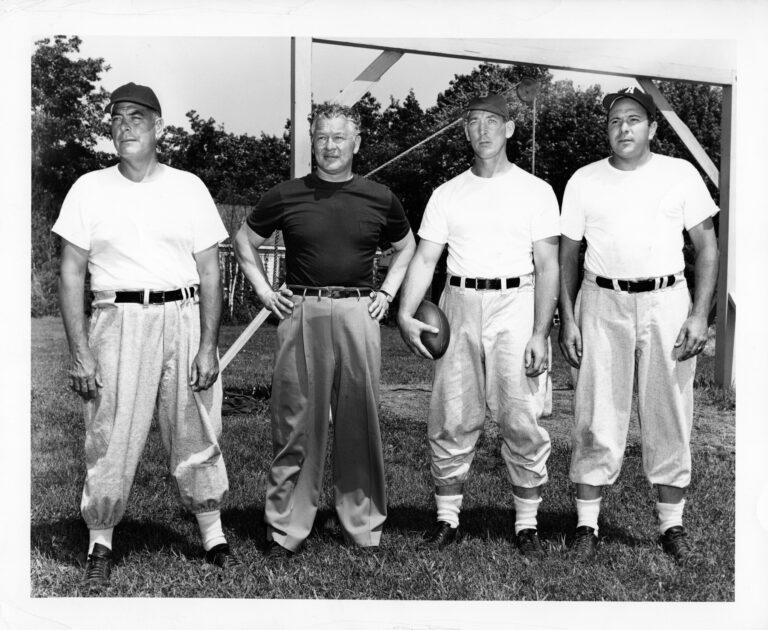
1949 season Packers coaches (from left): Tom Stidham, Lambeau, Charley Brock, and Bob Snyder. Image Credit: Unknown.
1949: Lambeau’s Last Stand
1949 was a year of turmoil for the Green Bay Packers: the stockholders learned that the team, in 1948, had lost more than $35,000; long-time director and major stockholder Andrew Turnbull resigned from the board after 27 years; losing seasons since 1945 and dropping attendance risked an estimated $50,000 – $90,000 financial hole by the end of the 1949 season.
After the Packers lost the season-opener to the Bears by a score of 17-0, Lambeau blew up the coaching structure of the team, appointing three assistants to be the on-field coaches. However, he was unable to restrict himself to general management duties, micro-managing the coaching staff and causing confusion at practice and during games.
“You’re all head coaches. I’ll never coach again…” is what Lambeau told his assistants, according to Bob Snyder, “what he did was divide the squad.” (Christl, Greatest Story in Sports, p.235).

Retired Packers “All-Stars,” Thanksgiving Day, 1949: Standing (left to right) are Fee Klaus, Herb Nichols, Curly Lambeau, Jug Earp, Lavvie Dilweg, Verne Lewellen, and Johnny Blood. Kneeling (left to right) are Charley Brock, Don Hutson, Arnie Herber, and Joe Laws
Packers “All-Stars” Game Fundraiser – Thanksgiving Day, November 24, 1949
In mid-November, the Executive Committee let it be known that the Packers were in dire financial straits and that they hoped to break even by raising $50,000 via a special “All-Stars” scrimmage on Thanksgiving Day. The scrimmage would pit current Packers players against retired stars of the team. On a cold and snowy Thanksgiving Day, an estimated 15,000 attended a half-hearted “game” which netted $35,647. “That was the only game I ever played in,” Tony Canadeo said in a 1996 interview, “where only one guy hit the ground and he slipped.”
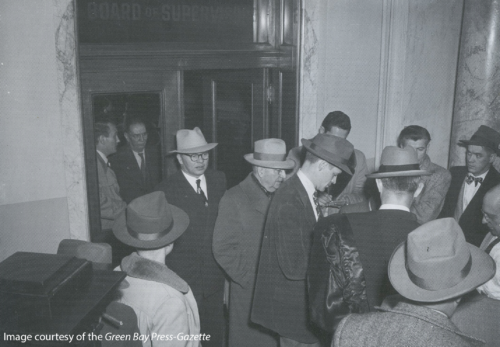
Lambeau leaving the November 30, 1949 Packers Board of Directors Meeting
Courthouse Showdown: November 30, 1949
During the last half of November 1949, the Packers Executive Committee and Lambeau were at loggerheads on to how to address the team’s financial crisis and future management.
Lambeau wanted full control of the team. He claimed to have four investors in the wings who would become shareholders of a private Packers corporation run by him. He wanted the board purged of his enemies and to have a new contract that explicitly allowed him to live in California for six months of each year. The Executive Committee wanted to see cuts to player salaries, to have Lambeau present in Green Bay rather than in California, and to have him clearly delegate duties.
These matters came to a head in a four-hour marathon meeting of the Packers Board of Directors on the evening of November 30, 1949. The meeting took place in the assembly room of the Brown County Courthouse. The late Lee Remmel, who was then a reporter for the Green Bay Press-Gazette and who would go on to become the team’s Public Relations Director and team Historian, waited with other reporters outside the meeting room that night. In a 2002 interview with current team Historian Cliff Christl, Remmel said that “it was an acrimonious meeting, no question about that,” and that “we could hear some occasional shouting, but we couldn’t determine what they were saying.”
The two main items of business that were addressed that night were, first, the plan to address the finances of the Packers, and second, Curly Lambeau’s contract renewal. On the first item, the Board rejected Lambeau’s bid to make the Packers a private corporation by recommending to shareholders that they issue $200,000 in additional stock with the stated aim of broadening community ownership to “enable everyone in Packerland who desires, to become an owner in the Packer team.” On the second item, the Board extended Lambeau’s contract as coach and general manager for two years, though no specifics were offered by Lambeau or any of the directors.
Two more losses to Washington and Detroit left the Packers at the bottom of the Division. Six weeks later, news broke that Lambeau had signed a contract to be the head coach of the Chicago Cardinals football team. After 30 years, Lambeau was no longer part of the team he founded.

